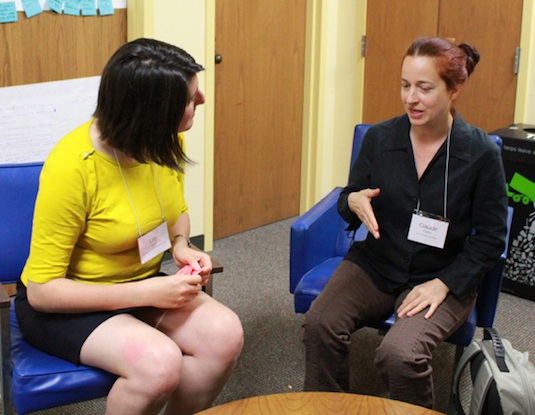

Claude Fortin (right) at the 2013 Digital Societies and Social Technologies (DSST) Summer Institute. Photo: Mona Kasra
GRAND was a proud sponsor of the 2013 Digital Societies and Social Technologies Summer Institute at the University of Maryland, College Park (July 28-August 1, 2013). Jointly organized by the Consortium for Science of Sociotechnical Systems (CSST) and the Summer Social Webshop, the event brings together a community of researchers from academia and industry focused on the problems and opportunities arising from the interplay of social and technological systems which span individuals, groups, organizations, and societies. This year, GRAND organized a delegation of three doctoral students to attend the event: Naureen Nazam (Dalhousie), Claude Fortin (SFU) and Farjana Eishita (Saskatchewan). The following is part of a three-part blog series about their experience.
By Claude Fortin
I am just coming back from a week at DSST2013, held in the headquarters of the Human-Computer Interaction Lab (HCIL) at the University of Maryland in Baltimore, the legendary flagship HCI lab founded by Ben Schneiderman in 1983. It was a wonderful workshop-packed 4-day summer institute spent in the company of great minds, some of the best junior and senior scholars researching socio-technical systems in the US. Amongst the 60-plus participants, I was one of the lucky three Canadian doctoral delegates sent by GRAND-NCE.
Attending all the talks and work shops allowed me to catch up with the cutting-edge technology-related research being conducted in the US, and more importantly, to network with likeminded scholars, some of which I may collaborate with on future research projects. Over the years, I have found that such seminars are particularly useful in learning about new research methods and approaches. This year, I was hoping to find out more about how ethnographic methods are currently being used in HCI research. I was most grateful to discover that this offering was indeed on the agenda.
During the morning workshop sessions on Tuesday, July 30th, I attended the 3-hour methodology Ethnographies of Large Sociotechnical Systems tutorial run by two top American scholars that happen to be of Canadian origin, Dr. David Ribes and Dr. Janet Vertesi. Their presentation focused on identifying and discussing challenges researchers face when using a multi-sited ethnographic approach. This topic is highly relevant to HCI research since it accounts for the study of sites that have multiple physical or virtual locations, which function like nodes in a network. Major takeaways from this workshop were: the advantages of comparing the different perspectives drawn from a team of ethnographers; understanding that multiple sites are crafted by researchers as they encounter them; and the importance of mindfully observing how power is produced in interrelations between network sites.
Other highlights include a workshop on the ethics of online micro-work and a talk on the challenges of interdisciplinarity. “Stick to a short, single-track elevator pitch to explain your research, even if you using an interdisciplinary approach,” was the word of advice given to us during the latter.
Finally, later in the week, I had the opportunity to discuss my empirical work with a small discussion group made up of one senior and two junior American scholars, who provided me with a number of new insights on how to operationalize my concepts; which US venues I can submit my research to in the next few years; and what publications, fields (such as STS, CMC and museum studies) and theories could inform my research in the extant literature.
Not only have this one-hour brainstorming session and the DSST2013 experience as a whole proven instrumental in helping me prepare my research design for the study I am conducting this upcoming fall, but it has also allowed me to refocus my doctoral lens to better meet my goals in the future.
Thanks to all the DSST2013 participants!